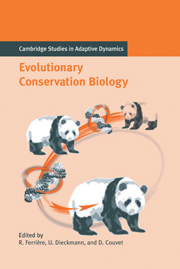Book contents
- Frontmatter
- Contents
- Contributing Authors
- Acknowledgments
- Notational Standards
- 1 Introduction
- Part A Theory of Extinction
- Part B The Pace of Adaptive Responses to Environmental Change
- 5 Responses to Environmental Change: Adaptation or Extinction
- 6 Empirical Evidence for Rapid Evolution
- 7 Genetic Variability and Life-history Evolution
- 8 Environmental Stress and Quantitative Genetic Variation
- Part C Genetic and Ecological Bases of Adaptive Responses
- Part D Spatial Structure
- Part E Community Structure
- References
- Index
- The International Institute for Applied Systems Analysis
7 - Genetic Variability and Life-history Evolution
Published online by Cambridge University Press: 15 August 2009
- Frontmatter
- Contents
- Contributing Authors
- Acknowledgments
- Notational Standards
- 1 Introduction
- Part A Theory of Extinction
- Part B The Pace of Adaptive Responses to Environmental Change
- 5 Responses to Environmental Change: Adaptation or Extinction
- 6 Empirical Evidence for Rapid Evolution
- 7 Genetic Variability and Life-history Evolution
- 8 Environmental Stress and Quantitative Genetic Variation
- Part C Genetic and Ecological Bases of Adaptive Responses
- Part D Spatial Structure
- Part E Community Structure
- References
- Index
- The International Institute for Applied Systems Analysis
Summary
Introduction
The persistence of populations in the face of environmental change depends upon their ability to adapt to changing conditions. Since genetic variation (specifically additive genetic variation) is a prerequisite for adaptation, a critical concern for the conservation biologist is that threatened and endangered species should retain both genetic variation and adaptive potential. Loss of genetic variation in small populations can also have other deleterious consequences, such as inbreeding depression. One of the primary goals of the conservation geneticist is to understand how genetic variation can be maintained within small and/or captive populations.
To understand maintenance of genetic variation is also a major concern for evolutionary biologists. Adaptation both requires additive genetic variation and erodes it at a rapid rate (Fisher 1930). Richard Lewontin also described the apparent ubiquity of genetic variation, even for traits that correlate highly with fitness, as a “paradox” (Lewontin 1974, p. 189) that evolutionary genetics had yet to satisfactorily explain. Although since 1974 progress has been made in understanding the maintenance of genetic variation, many investigators still consider it the central problem of evolutionary genetics. In this chapter, we describe possible solutions to Lewontin's paradox, empirical evidence that relates to these solutions, and some of the conservation implications of these results.
Genetic Variation and Life Histories
The paradox of genetic variation is particularly relevant to traits known as fitness components. These are traits (such as developmental rate, mating success, and fecundity) that directly determine Darwinian fitness.
- Type
- Chapter
- Information
- Evolutionary Conservation Biology , pp. 119 - 135Publisher: Cambridge University PressPrint publication year: 2004
- 2
- Cited by



